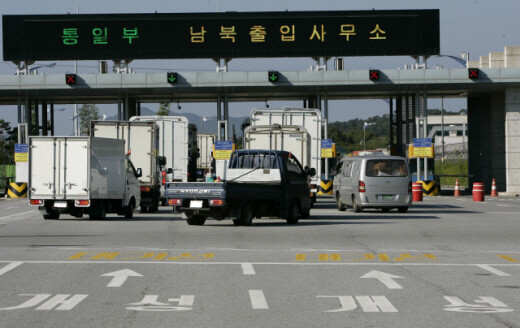hankyoreh
Links to other country sites 다른 나라 사이트 링크
Government announces plan to build North Korean economy post-reunification

Rebuilding the North Korean economy after reunification is likely to cost around US$500 billion, but the government said that it can raise this money without increasing taxes, through state-funded financial organizations and investment from the private sector.
This is the argument that Shin Je-yoon, chair of the Financial Services Commission, is planning to make in a presentation titled “Unification of the Korean Peninsula and Financial Policy Challenges,” which he will deliver on Nov. 19 during a conference about unification and finance hosted by the Korea Finance Corporation (KoFC).
The Financial Services Commission estimates that it will cost around US$500 billion to raise the North Korean per capita GDP (gross domestic product) from its current level of US$1,251 to US$10,000 within two years.
US$140 billion will be needed to build up infrastructure inside North Korea, including railroads (US$77.3 billion), roads (US$37.4 billion), and power generation (US$10.4 billion), while US$35 billion will be spent on setting up industries, such as electricity and electronics (US$2 billion) and farming and fisheries (US$27 billion).
In order to raise these funds, the government proposes to have public financial institutions find between US$250 billion and US$300 billion, 50% to 60% of the total, and to allow the private sector to invest between US$107.2 billion and US$186.5 billion in special economic zones and projects with guaranteed profitability.
The government also predicts that it can put US$100 billion of the US$330 billion in tax revenues it collects during the economic development of North Korea to use as funds for further development. These figures were calculated using the South Korean tax rate of 26%, under the assumption that North Korea will experience an average of 8% yearly growth during the first decade of development and 10% of yearly growth during the second decade.
In addition, the government believes that it can secure US$17 billion of funding through overseas development aid (ODA) from other countries.
As of 2013, North Korea’s level of economic development resembled South Korea’s during the 1970s.
North Korea’s GDP is 34 trillion won (US$30.93 billion), its government budget is US$6.62 billion, and its international trade is worth US$7.35 billion.
In contrast, South Korea’s GDP is 1428 trillion won (US$1.30 trillion), its government budget is US$287 billion, and its trade is worth US$1.08 trillion.
At the time of the reunification of Germany, West German GDP was 9.7 greater than that of East Germany. But the South Korean GDP is 42 times greater than North Korea’s, raising doubts about the feasibility of the Financial Services Commission’s plan for raising funds to rebuild North Korea.
By Hwangbo Yon, staff reporter
Please direct questions or comments to [english@hani.co.kr]

Editorial・opinion
![[Column] Season 2 of special prosecutor probe may be coming to Korea soon [Column] Season 2 of special prosecutor probe may be coming to Korea soon](https://flexible.img.hani.co.kr/flexible/normal/500/300/imgdb/original/2024/0426/3317141030699447.jpg) [Column] Season 2 of special prosecutor probe may be coming to Korea soon
[Column] Season 2 of special prosecutor probe may be coming to Korea soon![[Column] Park Geun-hye déjà vu in Yoon Suk-yeol [Column] Park Geun-hye déjà vu in Yoon Suk-yeol](https://flexible.img.hani.co.kr/flexible/normal/500/300/imgdb/original/2024/0424/651713945113788.jpg) [Column] Park Geun-hye déjà vu in Yoon Suk-yeol
[Column] Park Geun-hye déjà vu in Yoon Suk-yeol- [Editorial] New weight of N. Korea’s nuclear threats makes dialogue all the more urgent
- [Guest essay] The real reason Korea’s new right wants to dub Rhee a founding father
- [Column] ‘Choson’: Is it time we start referring to N. Korea in its own terms?
- [Editorial] Japan’s rewriting of history with Korea has gone too far
- [Column] The president’s questionable capacity for dialogue
- [Column] Are chaebol firms just pizza pies for families to divvy up as they please?
- [Column] Has Korea, too, crossed the Rubicon on China?
- [Correspondent’s column] In Japan’s alliance with US, echoes of its past alliances with UK
Most viewed articles
- 1No good, very bad game for Korea puts it out of Olympics for first time since 1988
- 2Division commander ordered troops to enter raging flood waters before Marine died, survivor says
- 3Korea’s 1.3% growth in Q1 signals ‘textbook’ return to growth, says government
- 4Will NewJeans end up collateral damage in internal feud at K-pop juggernaut Hybe?
- 5[Column] Season 2 of special prosecutor probe may be coming to Korea soon
- 6[Editorial] Korea’s surprise Q1 growth requires objective assessment, not blind fanfare
- 7[Column] ‘Choson’: Is it time we start referring to N. Korea in its own terms?
- 8‘We must say no’: Seoul defense chief on Korean, USFK involvement in hypothetical Taiwan crisis
- 9Korea sees more deaths than births for 52nd consecutive month in February
- 10Is N. Korea threatening to test nukes in response to possible new US-led sanctions body?